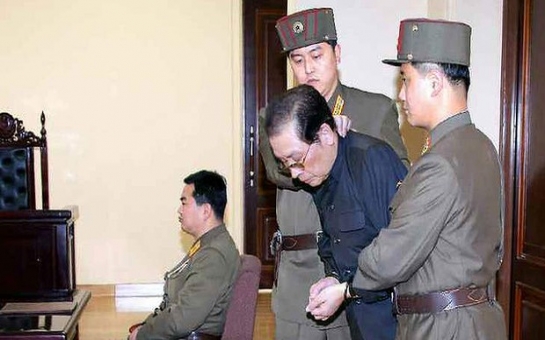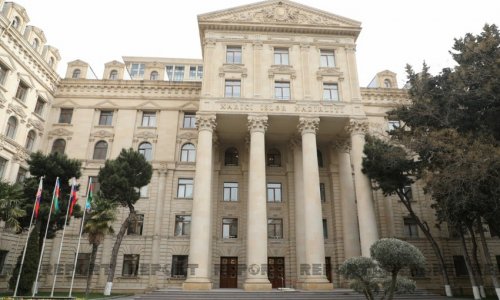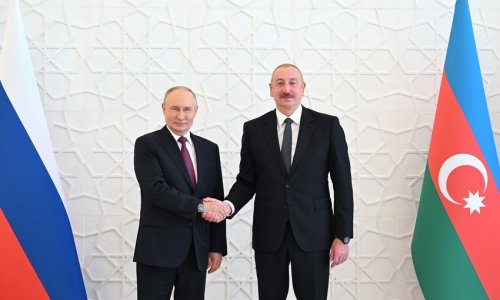If you've been on the internet in the last 24 hours, you've might have seen the story claiming that North Korean leader Kim Jong-un had his uncle executed last month by stripping him naked and feeding him to 120 hungry dogs.
The story was first reported by a minor Hong Kong outlet on December 12, was picked up by a Singaporean newspaper on December 24 and since late Thursday has been sweeping through nearly every corner of the media.
The only problem is that it's probably – probably – not true.
It was indeed a big surprise last month when South Korean intelligence revealed that Kim had purged his own uncle, Jang Song Thaek, which North Korea confirmed a couple of days later with a long screed in its state media.
The highly public nature of the purge, which ended with Pyongyang announcing Jang's execution, was totally unprecedented and legitimately shocking, which is a high bar for North Korea news.
Crazy-sounding stories happen with some frequency in North Korea, where the government has a well-earned reputation for taking political punishments to medieval extremes.
But there are five big reasons that this story just does not seem particularly plausible. The fact that the Western media have so widely accepted a story they would reject if it came out of any other country tells us a lot about how North Korea is covered - and how it's misunderstood.
First and foremost, let's consider the source. The story originated in a Hong Kong newspaper called Wen Wei Po, which oddly makes the claim without citing a source. With a couple of high-quality exceptions, Hong Kong media have a reputation for sensationalist and tabloidy stories that do not always turn out to be true. But, even by Hong Kong standards, Wen Wei Po is considered an unusually unreliable outlet. A recent study found that, out of Hong Kong's 21 newspapers, Wen Wei Po ranks 19th for credibility.
Second, consider the fact that the rest of the Chinese media have not touched this story in the almost-month since it came out. Some observers are treating the story as credible because Wen Wei Po is aligned with the Chinese government in Beijing; if anyone would know what really happened in Pyongyang, it would probably be the Chinese government, right? But Wen Wei Po is not anywhere near as close to China's power centres as official outlets such as Xinhua and the People's Daily.
The entire remainder of the Chinese media have been sticking to the same story that everyone else has: that Jang was killed by either machine gun or anti-aircraft guns (the two could plausibly be conflated). China has not been shy about expressing its displeasure with North Korea lately, but the fact that little Wen Wei Po is all alone on this story should tell us something.
Third, South Korea's media have also not touched the story. "This story has hardly been picked up on by Korean media which is one reason to be suspicious," Chad O'Carroll, who edits the news site NKNews.org, told me via email. "The other reason to be suspicious is because the rumour surfaced ages ago - but no one paid attention to it," he said.
South Korean media are quite plugged in to North Korean defector communities, to sources still in the country and most especially to South Korea's intelligence agency. Some of those outlets can be eager to pick up stories or rumors that portray North Korea in a negative light. And, as O'Carroll pointed out, they're not shy about running single-source stories. But South Korea's many news outlets, big and small, seem to be treating this story as so implausible it's not even worth mentioning. And they would know.
Fourth, the time lapse: this story has been around for almost a month, and it's not been anywhere near confirmed. That alone is not surprising, but the fact that Asia's many media circles have not even deigned to acknowledge the report is pretty telling. You might say that Asian media are treating it the way outlets respond when the National Enquirer reports that Hillary Clinton is ensnared in a sex scandal - by ignoring it.
Fifth, the predominant story of what happened is much more plausible. It's not as though we're operating completely in the dark about Jang's execution. Far more credible outlets with far more credible sourcing have consistently described Jang as having been executed by firing squad; typically he is said to have been killed by anti-aircraft guns, though sometimes that is rounded down to machine guns.
This is just much more consistent with what we know about North Korea. "He was in a military tribunal so it seems logical he would be executed by firing squad," O'Carroll said. The fact that South Korea's better-sourced and more credible media outlets continue to maintain that Jang was executed by firing squad, and not by 120 hungry dogs, as reported by a lone Hong Kong newspaper, should really underscore which version of events is more likely.
Sixth, as the satirist Karl Sharro put it, "The clue about the story of Kim Jong Un's uncle being fed to 120 hundred dogs being false is who has time to count dogs at a time like that". Okay, so that's not a real reason to disbelieve the story. But it was too funny not to include.
But all of this raises the question: why are so many people – and so many major media outlets – still willing to treat this implausible story as plausible? This seems to be a problem particular to stories out of North Korea, about which almost any story is treated as broadly credible, no matter how outlandish or thinly sourced. There's no other country to which we bring such a high degree of gullibility.
A friend who's covered North Korea for several years and has visited the country, Isaac Stone Fish, now of Foreign Policy, once joked to me that as an American journalist you can write almost anything you want about North Korea and people will just accept it. Call it the Stone Fish Theory of North Korea coverage. We know so little about what really happens inside the country, and especially inside the leader's head, that very little is disprovable. But the things we do know are often so bizarre that just about anything can seem possible.
And, there's no getting around this, we in the media have a certain incentive to pick these stories up. "As you know, NK stories tend to get a lot of hits, so it's easy to see why editors will want to pursue these stories," O'Carroll said. "I guess editors feel it is more legitimate to publish unverifiable, sensationalist information on North Korea because they can always fall back on the defence: 'How could we check? North Korea is so closed.'"
There's also a lost-in-translation element to American credulity about outlandish stories out of North Korea; to some degree, we fall victim to our own ignorance of how that society actually works. As I wrote in 2012 when the US media were briefly aflame with nonsensical rumours that Kim had been assassinated in Beijing, the images out of the country are so bizarre and hard information so scant that there's little to prevent our imaginations from running wild. We are ready to believe anything.
Still, the thing about this story and so many others like it from North Korea is that there is a chance, however remote, that it could still be true. Yes, there is an awful lot of evidence suggesting it's probably false, but this being North Korea, there are also some reasons to allow for its plausibility.
"Bottom line is: unlikely but I can't rule it out," O'Carroll, whose NKNews site is known for its sober and careful coverage of North Korea, acknowledged. "While this one definitely feels exaggerated, who knows? With North Korea's KCNA publishing films showing the destruction of effigies of [former South Korean President] Lee Myung-bak by hungry dogs last year, and of course publishing several cartoons depicting the gruesome death of the same president, at least parts of the story could be within the realm of true. Don't forget the North Koreans even hosted competitions last year to think up the most gruesome way to kill 'Traitor' [Lee Myung-bak]; the prize? The winner could carry out that particular death sentence!"
Ultimately, while North Korea-watchers are certainly not buying this story, O'Carroll wouldn't take the bait when I gave him an opportunity to scold media outlets for picking it up. He asked me, rhetorically: "What are editors meant to do? Ignore a story because it 'feels' wrong, but could end up later to be true? I don't know."
The Washington Post
ANN.Az











